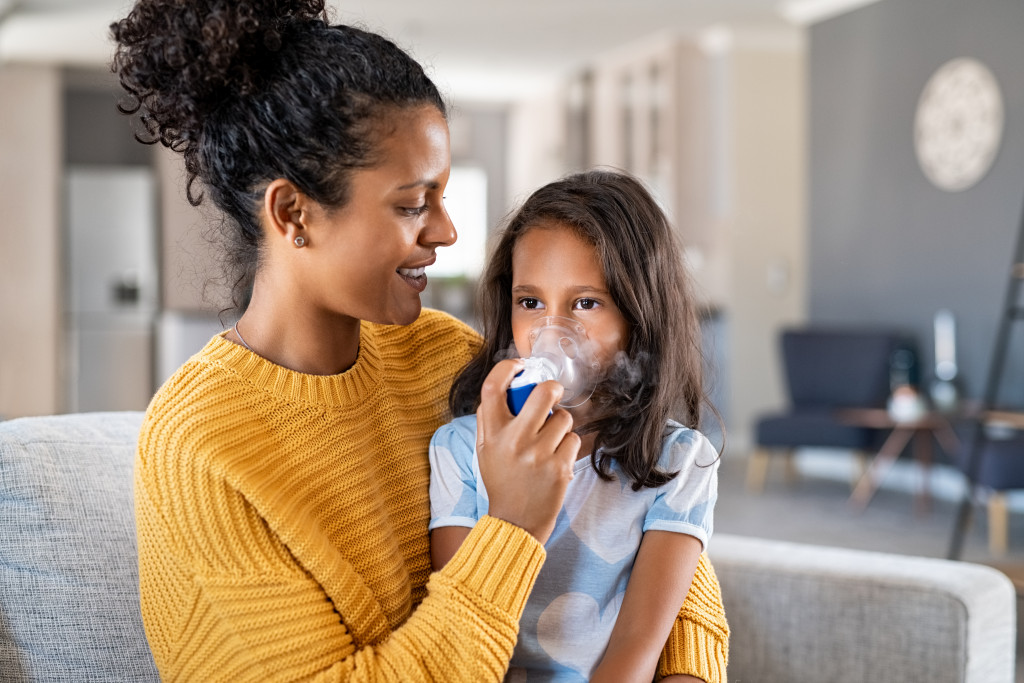- Educate kids about their allergies and asthma, including potential triggers and symptoms, to help them recognize when they need medical care or lifestyle changes.
- Have an emergency plan in place and a support system of family and friends, medical professionals, and school staff who can provide resources if needed.
- Encourage healthy lifestyle habits, such as exercise and good hygiene, to keep symptoms under control.
- Monitor air quality in your home or area if necessary and consider investing in an air purifier.
Allergies and asthma are common conditions that can be difficult for both kids and parents to manage. But with the proper knowledge, resources, and support, it is possible to help children live healthy and happy lives despite their allergies or asthma. Here’s a closer look at how anyone can do this.
Education and Preparedness
The first step in helping kids manage their allergies or asthma is educating them about their condition. Kids should understand what triggers their allergies or asthma (such as certain foods or environmental factors) and the symptoms they may experience.
Knowing these things helps kids recognize when they need to seek medical attention or make lifestyle changes. It also gives them the tools they need to advocate for themselves whenever necessary.
Additionally, it’s essential to prepare your child for any potential emergency scenarios that could arise due to an allergic reaction or asthma attack. Make sure your child knows who to contact in case of an emergency so that they know exactly who to turn to if needed.
It’s also a good idea for your child to carry an EpiPen if they have severe food allergies—or better yet, wear a device that will alert people around them of their condition in case of an emergency.

Support Systems
It’s essential for kids with allergies or asthma to have a robust support system in place. This is especially important when they’re away from home, such as at school or on vacation. Here are some networks to consider:
Family and Friends
Make sure those closest to your child know about their condition and understand how to help them if needed. This is particularly useful if your child experiences an allergic reaction or asthma attack while they’re not with you. For instance, if your child visits a relative’s house, make sure the relative is aware of any relevant medical information.
Medical Professionals
Your child should have a designated pediatrician or allergist who can provide resources and answer any questions. Additionally, if your child needs medical attention in an emergency, make sure they know which hospital has their medical records on file so that the right care can be provided quickly.
To be better prepared, it’s also advisable to connect with a reliable pediatric urgent care center in your area that can treat any allergies or asthma-related emergencies. This will ensure your child receives the care they need when needed. Urgent care centers accept walk-ins and offer same-day appointments, making them an excellent option for busy families.
School Staff
Having the school staff aware of your child’s allergies or asthma is invaluable in terms of keeping them safe and healthy. Make sure to provide the school nurse, teachers, and other administrators with a written care plan for your child, outlining any medications or treatments they may need in the event of an emergency.
Support Groups
Many communities have groups specifically designed for children with allergies or asthma. This is a great place for kids to meet others who understand their condition and offer support. Moreover, these groups often have activities or educational workshops that can help kids better understand and manage their health.

Healthy Lifestyle Habits
Living a healthy lifestyle can significantly impact managing allergies and asthma. This means encouraging your child to get plenty of exercises, practice good hygiene habits, eat nutritious foods, and get enough rest each night.
Additionally, limiting their exposure to potential allergens or irritants can help keep symptoms under control. For starters, you can keep your home clean and dust-free and discourage your child from smoking or being around other people who do.
It’s also important to monitor the air quality in your area if your child is sensitive to allergies or pollutants. If necessary, you can use an air purifier at home to reduce the presence of allergens.
Finally, keeping a daily log of your child’s symptoms can be helpful. This will help you identify any potential triggers and determine the best course of action for managing their condition.
Living with allergies or asthma can be challenging at times, but it doesn’t have to be overwhelming. By taking proactive steps towards education, preparedness, and emotional support systems for children facing these conditions, parents can ensure that they get the help they need while still living happy and healthy lives.


